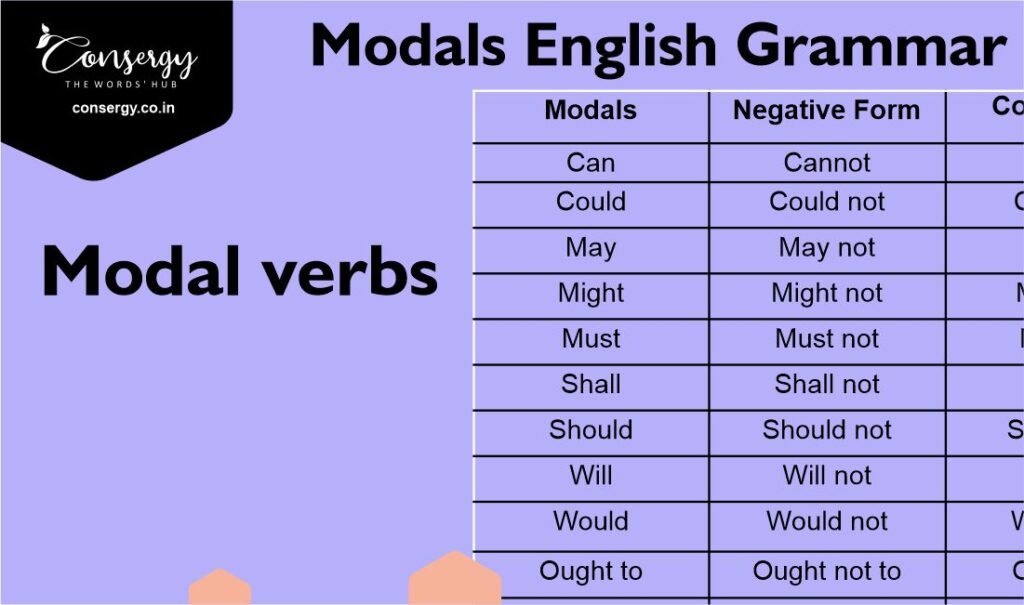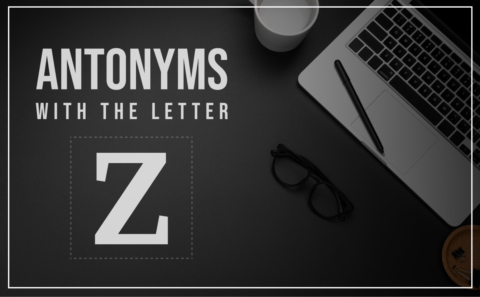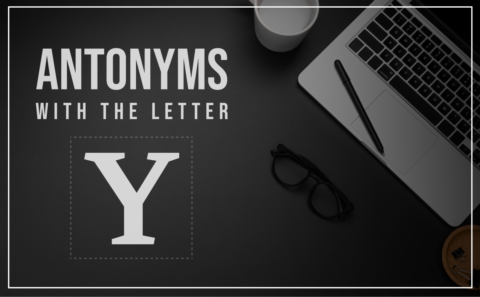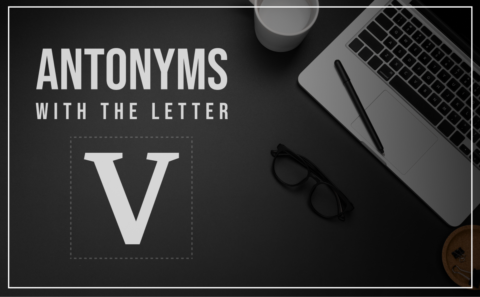Join us on a journey through English Grammar. Our guide focuses on auxiliary verbs, providing you with a solid foundation for your English language skills.
An auxiliary verb is a helping verb that helps the main verb. The auxiliary verb takes the position of the main verb in case it stands alone in the given sentences.
Auxiliaries are 24 in number. These are divided into two types
Primary Auxiliaries: is, am, are, was, were, has, have, had, do, does, did.
Modal Auxiliaries: can, could, may, might, must, shall, should, will, would, ought to, need, used to, dare.
Modal verbs
| Modals | Negative Form | Contracted Negative Form |
|---|---|---|
| Can | Cannot | Can’t |
| Could | Could not | Couldn’t |
| May | May not | Mayn’t |
| Might | Might not | Mightn’t |
| Must | Must not | Mustn’t |
| Shall | Shall not | Shan’t |
| Should | Should not | Shouldn’t |
| Will | Will not | Won’t |
| Would | Would not | Wouldn’t |
| Ought to | Ought not to | Oughtn’t |
| Need | Need not | Needn’t |
| Used to | Used not to | Usedn’t to |
| Dare | Dare not | Daren’t |
Modal verbs
Note: Modals depend on the mood of the speaker.
Uses of Modals
Can
To express ability, capacity and power.
- I can teach English.
- I can lift this box.
- I can exercise for 5 hours daily.
- I can run fast.
- I can solve all these questions.
For giving or asking permission.
- Can I take your pen?
- You can go now.
To express possibility.
- If you don’t wear a helmet, you can hurt your head.
- Accidents can happen anywhere.
- I can find shops on the way.
Informal request.
- Can I borrow your car?
- Can you help me?
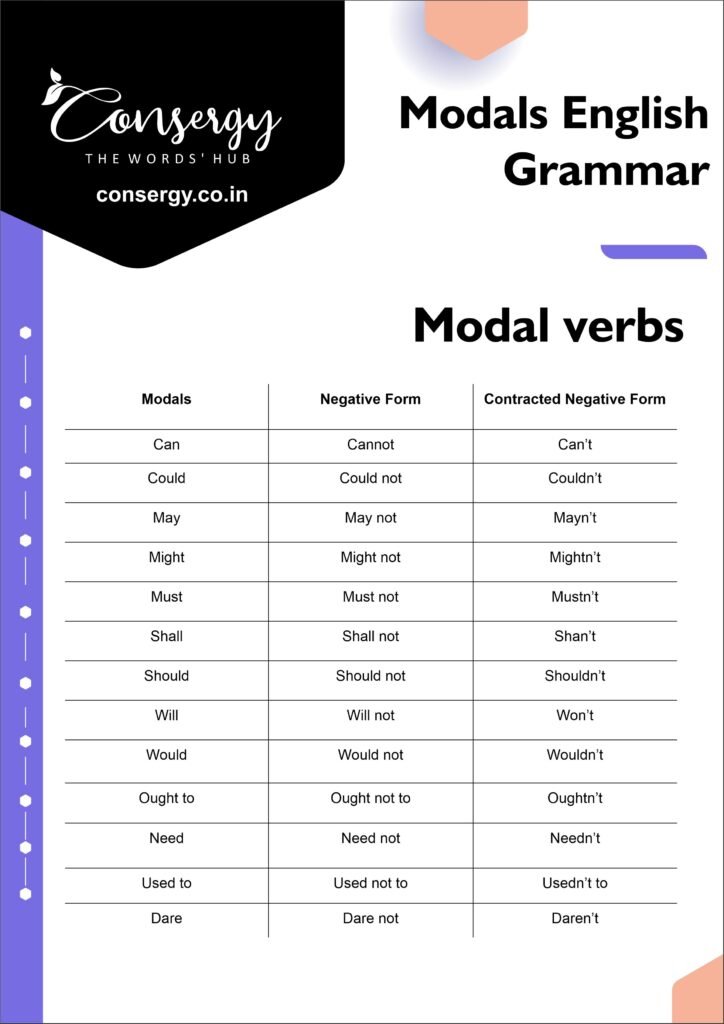
Could
Past form of can.
- I could teach English.
Show possibilities both in the present and past time.
- I could attend the meeting.
- Don’t be rude to me, I could hit you.
‘Could you’ can be used for a polite request.
- Could you please pass me that book?
- Could you please send that message to me?
To express past possibilities.
- The book was kept so high that I couldn’t reach it.
- It was so dark that I couldn’t see anything.
To express an imaginary condition.
- If I had reached earlier, I could have caught the train.
Informal request.
- Could you please give me your bike?
- Could you make me a sandwich?
May
Used to seek or grant permission.
- May I come in, Ma’am?
- You may go now.
To express possibility
- There are clouds in the sky. It may rain tonight.
- The news may be true.
To express personal wish, hope or faith.
- May you live long!
- May God bless you!
To express purpose
- Work hard so that you may pass.
- We eat so that we may live.
When a sentence begins with words like: whatever, though
- Whatever she may do, she cannot forget her home. Though Radha may have learnt English for months, her English is still poor.
Might
For asking permission hesitantly
- Might I take your pen?
- Might I stay here for a day?
To express past possibility
- Your elder brother might have become a pilot.
- He fell from the roof and broke his leg. He might have died.
To express weak or remote possibility.
- Take a taxi. You might catch the train.
- She might reply to my letter.
To express purpose in the past.
- He took medicine so that he might get well.
Shall
Used with I and We when expressing future time.
- I shall be fifty next month.
To express promise.
- You shall get a prize for your patience.
To express command or threat.
- He shall be punished if he doesn’t complete his work on time.
To denote legal notices or official regulations.
Trespassers shall be punished.
To express determination.
You shall help him.
Should
Past form of shall
To express advice or suggestion.
- We should take a bath daily.
- We should brush our teeth daily.
To express duty.
- We should obey our elders.
- We should always speak the truth.
In conditional sentences to express a very unlikely condition.
- Should it rain, we shall not go home.
- Should it rain, there will be no match.
To express purpose when ‘lest’ conjunction is used in the sentence.
- Study carefully lest you should fail.
- Drive slowly lest you should get into an accident.
Will
To express general instructions.
- All the students will go for the assembly.
- Tomorrow you will submit your notebooks.
To make polite requests.
- Will you please convey my message to the chairman?
To express possibility.
It will be a storm.
It will be done by tomorrow.
To express habits.
- Accidents will happen.
- The rates will rise.
To express an invitation. Both will and won’t can be used.
- Will you stay a little longer?
- Won’t you stay a little longer?
Use of ‘will’ with a first person pronoun shows promise, determination, threat, warning and willingness.
- I will help you.
- We will come with you to Delhi.
- We will fight this battle together.
To express threat or warning.
- I will arrest you.
- I will punish you if you do this again.
To express willingness.
- I will finish my work on time.
- I will become a doctor when I grow up.
Imperative sentences expressing command changes into soft request when ‘will you?’ is added as a question tag at the end of the sentence.
- Shut the door, will you?
- Bring a glass of water for me, will you?
Would
Past form of ‘will’.
To express polite requests in the present.
- Would you lend me your pen?
- Would you please tell me the way to the airport?
For the happenings in the past (mostly habitual).
- Sometimes my mother would get too angry.
- On Mondays, Meera would usually go for a run.
To denote ‘wish’.
- Would that I had become an engineer!
- Would that I had finished it before midnight!
To express polite offers, permission and wishes in interrogative sentences.
Would you like to buy our house?
Would you mind if I have this here?
To express past possibilities.
- Jaya would be about eighty when she died.
Must
To express compulsion.
- We must reach school in time to avoid punishment.
To express a strong possibility.
- He must be a thief.
- She must attend all her classes.
To express command.
- You must not move from there.
To express necessity both in the present and the future time.
- You must work hard to pass this examination.
To express strong advice.
- The mother said, “You must close all the doors at night.”
To express logical inference.
- Radha is an excellent dancer. She must win the competition.
Ought to
To express advice or suggestion.
- We ought to take a bath daily.
- We ought to brush our teeth daily.
To express duty.
- We ought to obey our elders.
- We ought to speak the truth.
Have to
- To express an external obligation or compulsion. It means it is imposed by some other authority or circumstances and that too external. So, personal feelings are not involved.
- You have to complete this work by tomorrow.
- You have to go now. It’s time for you to catch the train.
Need
Used in negative and interrogative sentences.
Need is used as a main verb.
- Does he need to go there?
- I needn’t write more.
- I need to finish this project before Saturday.



